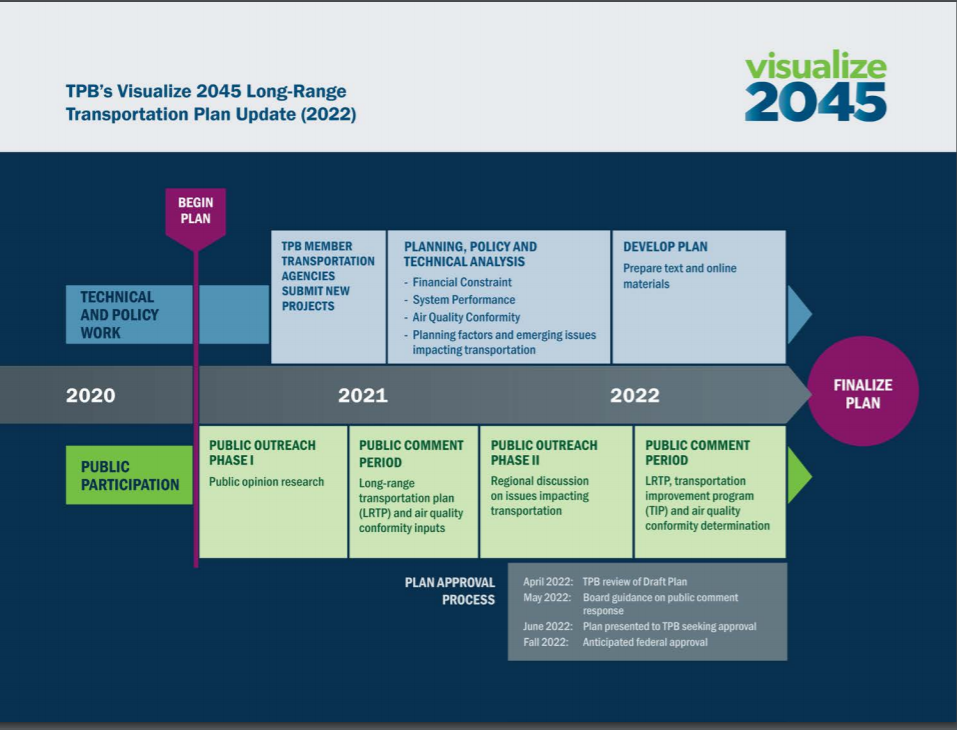The update for the region’s long-range transportation plan, Visualize 2045 is reaching an important milestone. At its December meeting, the TPB will take up the Technical Inputs Solicitation and officially kick-off the plan’s development.
Why is the Technical Inputs Solicitation important?
The Technical Inputs Solicitation is important because it communicates what types of projects, programs and policies are federally required to be included for the update of the region’s long-range transportation plan. It also communicates the types of projects that the region would like to see planned and funded in the future, to help achieve our shared regional goals by providing effective transportation options for traveling in the region.
Satisfying federal requirements
The plan update requires that the TPB gathers all of the inputs necessary for its staff to test the Constrained Element of Visualize 2045 for “fiscal constraint” and “air quality conformity”—two federal requirements designed to ensure that the region’s long-range transportation plans are financially feasible and that they support long-term air quality improvement goals.
TPB’s member agencies are responsible to maintain, operate and expand the transportation infrastructure and services. Agencies are also required to identify the operations and maintenance programs that are needed to keep the planned transportation system in a state of good repair. This includes major rehabilitation or replacement of aging roadways, bridges, railcars, transit stations and stops, and other infrastructure as it nears the end of its useful lifespan. Expansion programs generally entails adding roadway and/or transit capacity and at times reducing capacity by changing current infrastructure or service.
An estimate of the total costs for such operations, maintenance and expansions programs is required to be included in Visualize 2045. Funding for day-to-day operations and maintenance activities, like repaving roadways, inspecting, and maintaining transit vehicles, and paying train and bus operators, must also be identified. Along with an estimate of the revenues the agencies reasonably expect to have to pay for these expenditures. This is the “fiscal constraint” test of Visualize 2045.
Projects that add or remove roadway or transit capacity could affect air quality. These include, system expansion projects like new or widened roadways, new transit lines or bus only lanes, or expanded transit service on existing lines. Because of that effect, they are required to be in Visualize 2045 and part of the “air quality conformity” test.
Another key required input is transit service and fare assumptions—the “policies” that will affect the operation of the transportation system and could therefore affect travel patterns and air quality. This includes new or updated route, frequency, and fare policy information for the region’s rail and bus systems, as well as new or updated lane restrictions and hours of operation for HOV and HOT facilities.
How do these projects further regional priorities?
The TPB has worked continually to develop and adopt a set of goals and priorities to inform local decision making on the types of projects, programs, and polices it seeks for its long-range transportation plan. In 2018, the TPB adopted seven transportation initiatives. The TPB noted that these ideas, if funded and enacted, would have the potential to significantly improve the region’s transportation system performance compared to current plans and programs. If the region can make these ideas a reality, they can be part of a comprehensive strategy to meet climate resiliency goals.
The seven Aspirational Initiatives are:
- Bring Jobs and Housing Closer Together
- Expand Bus Rapid Transit and Transitways
- Move More People on Metrorail
- Provide More Telecommuting and Other Options for Commuting
- Expand Express Highway Network
- Improve Walk and Bike Access to Transit
- Complete the National Capital Trail Network
Learn more about the aspirational initiatives
When agencies submit new projects, policies or programs for inclusion in the Visualize 2045 update, they will be asked to document how the submissions support or advance regional goals, including equity considerations and climate resiliency goals.
TPB assembles information about the new projects to provide an important opportunity for board members, stakeholders, and members of the public to review and comment on the inputs before they are approved. Once comments are considered and inputs are approved, the inputs are used by TPB staff to analyze future travel conditions and to conduct the air quality conformity analysis to help decision makers and the public “visualize” the region’s future under current plans.
Finally, agencies are invited to submit bicycle and pedestrian projects, especially those that support local circulation within Activity Centers or are part of larger regional facilities.
Learn more about the policy considerations and conformity input categories.
What will happen next with the inputs?
The deadline for agencies to submit their inputs is February 12, 2021. After that, staff will review the information provided and prepare it to be shared with the public. A 30-day public comment period will take place from April 2, 2021 to May 3, 2021. During this time, TPB members, stakeholders, and the public will have an opportunity to comment on the inputs, including whether and how they support shared regional goals and priorities. At its June meeting, the TPB will be asked to approve the inputs for use in the air quality and other analyses.

The TPB is slated to approve Visualize 2045 in its final form in June 2022.
Read the draft Visualize 2045 Technical Inputs Solicitation document